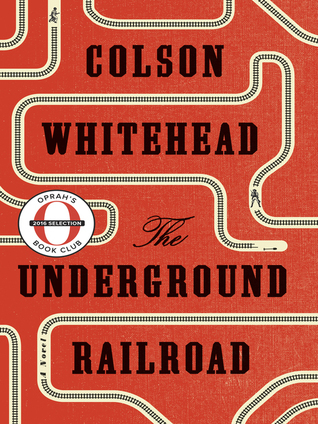 Cora is a slave on a Georgia cotton plantation. It is as horrible as it sounds, violent and vile in every imaginable way. In addition to the cruelties of slavery, Cora is also an outcast among her fellow slaves. In short, her life is horrible. One day Caesar, one of the newer slaves to the plantation, asks Cora to run away with him. As first she says no. The punishment for a runaway attempt is not only death, but the most painful death the sadistic slave masters can think of. Caesar urges her to reconsider and eventually Cora decides to run.
Cora is a slave on a Georgia cotton plantation. It is as horrible as it sounds, violent and vile in every imaginable way. In addition to the cruelties of slavery, Cora is also an outcast among her fellow slaves. In short, her life is horrible. One day Caesar, one of the newer slaves to the plantation, asks Cora to run away with him. As first she says no. The punishment for a runaway attempt is not only death, but the most painful death the sadistic slave masters can think of. Caesar urges her to reconsider and eventually Cora decides to run.I had high hopes for this, what with all the awards and nominations for awards this book has received. Unfortunately it didn't quite live up to the hype. For starters there is the idea of the railroad itself. Here the underground railroad isn't just a metaphor, it is an actual train or at least a single train car. Anytime someone mentions this book they mention this so I was really looking forward to seeing how Whitehead was going to flesh this out. Unfortunately there wasn't very much meat on this bone. How the railroad was built, by whom, or how people got involved with it was never explained. So making the underground railroad an actual train instead of it simply being a metaphor didn't really add much to the story.
Cora's journey is epic. In epics I think you either need a really strong main character to connect to, a character whose joy and pain you feel bodily with each word of the story. Or alternatively, the main character can be less important than the journey itself. In this case the character is more of a device used to flesh out the events surrounding the main character. In The Underground Railroad I didn't exactly get one or the other. Cora isn't the strongest of characters. I felt the story in one respect because it is about slavery and that alone elicits strong feelings but Cora herself felt too removed and too distant from the story even though she was its main character. As for her journey, Cora visits different states, each of which is dealing the population of slaves and free Black people differently. Whitehead uses these different states to touch on various actual historical events (Nat Turner rebellion and the Tuskegee syphilis experiments, and more) but it didn't quite explore them enough.
I'm not sure if I liked this book or not. There were aspects of it I definitely liked. There were many great ideas but in the end it fell a little flat for me. I am glad I read it, so that's something.
No comments:
Post a Comment
I look forward to your comments. Tell me about the books you're reading.